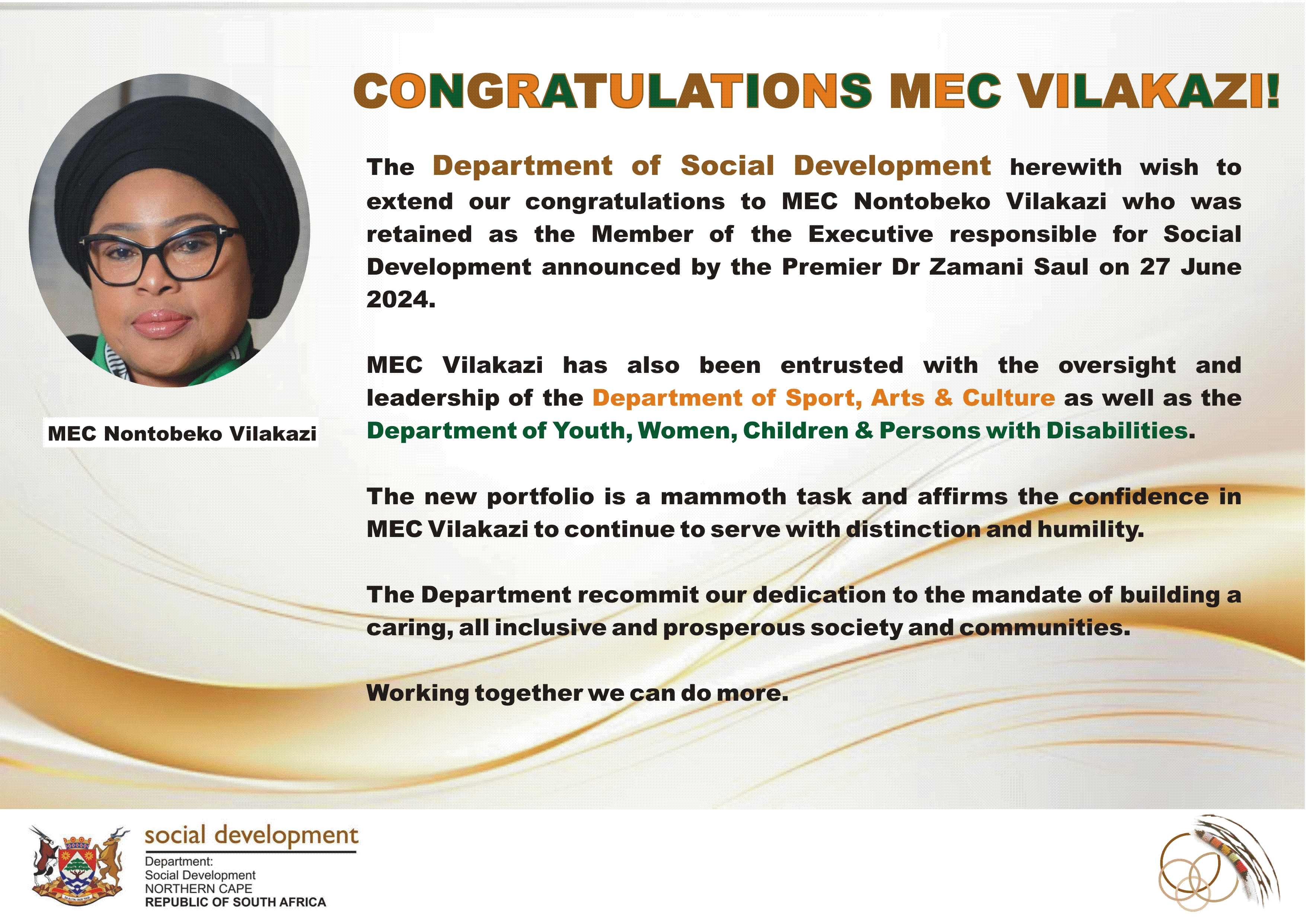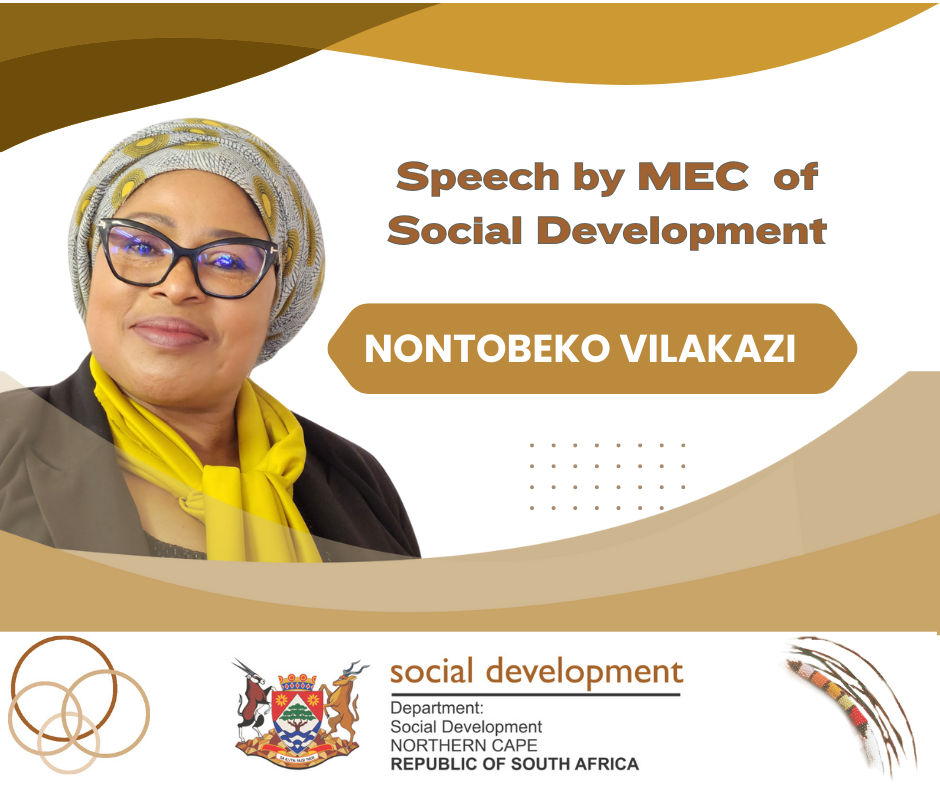2023-11-30 JICA Respite Care for Children with Disabilities: 30 December 2023
The Northern Cape MEC for Social Development Ms Nontobeko Vilakazi, acting Chief Director: Social Welfare Services Ms Portia Qondani and a representative of ZF Mgcawu Executive Mayor Ms Maureen Catherine Basson, on 30 November 2023, joined the respite care working group, as well as representatives of the National, Provincial and ZF Mgcawu District of the Department Social Development and the Japan International Cooperation Agency (JICA), at the Oasis Skills Development Centre to discuss the feedback on the achievements and plans for 2024/2025.
It was reported that the following activities were implemented to date:
- The establishment of a working group comprising of the parents of children with disabilities, persons with disabilities, social workers, NPO members and government officials (e.g. Departments of Social Development, -Health, -Education, the Human Rights Commission etc.)
- A baseline survey was done to identify: the barriers faced by children with disabilities and their families; the most important areas where respite care can help, and to determine the availability of resources and services.
- Home visits, during which 12 mothers of children with disabilities were interviewed. These mothers indicated that they have no time to go out for their own business.
- Capacity-building workshops were held for parents of children with disabilities and working groups.
- Capacity-building programs for caregivers, service providers (NPOs) and social workers were developed and implemented.
- Activity plans developed by the working groups were developed and implemented.
- In the quest to elevate the voice of the parents two (2) respite care models were selected i.e. Home-based Care, facilitated by "Strong Women" (mothers of children with disabilities) and the Center-based Care model facilitated by the Oasis Skills Development Centre.
- The registration of "Strong Women" as an NPO.
- The identification of potential caregivers for both models.
- Capacity building of 18 potential caregivers from the Oasis Skills Development Centre and "Strong Women".
- Successfully screening of 17 caregivers in terms of the Children's Act.
- Submission of business plans by both models for possible funding for 2024/2025.
The highlight and ongoing plan for 2023/2024, includes the practical training of caregivers at the Iris House in Cape Town.
The second phase of the project (2024 – 2027) is the Expansion Plan, which seeks to develop a Respite Care Service Delivery Model at the community level.
In the Northern Cape, the project continues to be implemented in Upington in the Dawid Kruiper Municipality. Already back in November 2021 the first stakeholder introductory meeting on Respite Care was held at the Oasis Skill Development Centre in Upington.
The following outputs will be implemented in Upington:
- The development of a referral mechanism (referral protocol), to share the information with service users and existing social resources.
- The enhancement of the capacity of human resources involved in the delivery of respite care services.
- The identification and development of a costing model and available funding mechanisms for implementing home-based- and centre-based care services
- The roll-out to other Districts.
WHAT IS RESPITE CARE SERVICES?
Respite care means “temporary relief” and a “short period”. The respite care service seeks to provide temporary relief to parents and/or primary caregivers to take a much-needed break from the demands of caregiving to a child with a disability or chronic illness.
Respite care can take place in a child's own home, at daycare centres, or at residential- or nursing facilities that offer overnight stays – for a few hours a week or an extended vacation.
Seeking respite care can help ease the burden of family caregiving and help to relieve stress, restore your energy, and promote balance in the caregiver and family's life. It can also prevent the caregiver from becoming exhausted, isolated, or even burned out, thereby preventing abuse and neglect.
Respite care benefits children with disabilities, by improving their development outcomes (providing them with variety, stimulation, and a welcome change of routine).
BACKGROUND
The Department of Social Development has fostered a partnership with the JICA since 2015, with the focus on the empowerment of persons with disabilities and disability mainstreaming within the South African Context.
Training and capacity building was conducted with various stakeholders in all nine (9) provinces nationally. Whereafter pilot projects were implemented in four provinces i.e. Limpopo, Free State, Kwazulu-Natal and the Eastern Cape, which led to the development of guidelines on the Empowerment of Persons with Disabilities and Disability Mainstreaming at District level (DEM Guidelines).
Following the collaboration with JICA and the four Provinces, interest was expressed in developing Respite Care Services for children with disabilities and their families, as most parents bear the brunt of taking care of their children 24-hours a day without any kind of support. It is for this reason that the Respite Care program was identified as one of the main solutions to foster the development of support services for families of children with disabilities.
The National Department of Social Development in collaboration with the JICA has been implementing the technical cooperation project from 2021 to 2023 to develop community-based respite care services for children with disabilities and their families.


